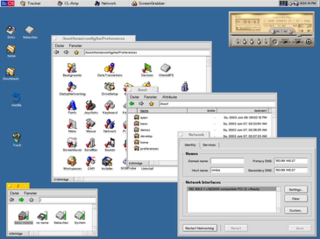
BeOS is a discontinued operating system for personal computers that was developed by Be Inc. It was conceived for the company's BeBox personal computer which was released in 1995. BeOS was designed for multitasking, multithreading, and a graphical user interface. The OS was later sold to OEMs, retail, and directly to users; its last version was released as freeware.
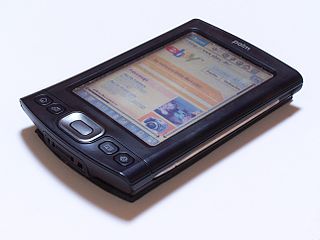
A personal digital assistant (PDA) is a multi-purpose mobile device which functions as a personal information manager. Following a boom in the 1990's and 2000's, PDA's were mostly displaced by the widespread adoption of more highly capable smartphones, in particular those based on iOS and Android in the late 2000's, and thus saw a rapid decline.

The Sony CLIÉ is a series of personal digital assistants (PDAs) running the operating system (OS) Palm OS, developed and marketed by Sony from 2000 to 2005. The devices introduced many new features to the PDA market, such as a jog dial interface, high-resolution displays, and Sony technologies like Memory Stick slots and ATRAC3 audio playback. Most models were designed and manufactured in Japan. The name was initially an attempt at a new coinage term, though it means tool in the Jèrriais language.

Palm OS was a mobile operating system initially developed by Palm, Inc., for personal digital assistants (PDAs) in 1996. Palm OS was designed for ease of use with a touchscreen-based graphical user interface. It was provided with a suite of basic applications for personal information management. Later versions of the OS were extended to support smartphones. The software appeared on the company's line of Palm devices while several other licensees have manufactured devices powered by Palm OS.
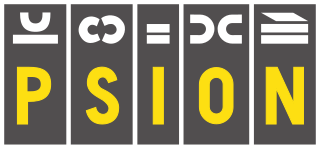
Psion PLC was a designer and manufacturer of mobile handheld computers for commercial and industrial uses. The company was headquartered in London, England, with major operations in Mississauga, Ontario, Canada, and other company offices in Europe, the United States, Asia, Latin America, and the Middle East. It was a public company listed on the London Stock Exchange and was once a constituent of the FTSE 100 Index.

Palm, Inc., was an American company that specialized in manufacturing personal digital assistants (PDAs) and developing software. Palm designed the PalmPilot, the first PDA successfully marketed worldwide, and was known for the Treo 600, one of the earlier successful smartphones. Palm developed the Palm OS software for PDAs and smartphones released under its line of Palm-branded devices and also licensed to other PDA manufacturers.

Palm is a now discontinued line of personal digital assistants (PDAs) and mobile phones developed by California-based Palm, Inc., originally called Palm Computing, Inc. Palm devices are often remembered as "the first wildly popular handheld computers," responsible for ushering in the smartphone era.

GPE is a graphical user interface environment for handheld computers, such as palmtops and personal digital assistants (PDAs), running some Linux kernel-based operating system. GPE is a complete environment of software components and applications which makes it possible to use a Linux handheld for tasks such as personal information management (PIM), audio playback, email, and web browsing.
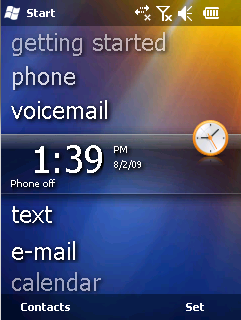
Windows Mobile was a mobile operating system developed by Microsoft for smartphones and personal digital assistants.
The Access Linux Platform (ALP) is a discontinued open-source software based operating system, once referred to as a "next-generation version of the Palm OS," for mobile devices developed and marketed by Access Co., of Tokyo, Japan. The platform included execution environments for Java, classic Palm OS, and GTK+-based native Linux applications. ALP was demonstrated in devices at a variety of conferences, including 3GSM, LinuxWorld, GUADEC, and Open Source in Mobile.
Mobipocket SA was a French company incorporated in March 2000 that created the .mobi e-book file format and produced the Mobipocket Reader software for mobile phones, personal digital assistants (PDA) and desktop operating systems.
A mobile operating system is an operating system used for smartphones, tablets, smartwatches, smartglasses, or other non-laptop personal mobile computing devices. While computers such as typical/mobile laptops are "mobile", the operating systems used on them are generally not considered mobile, as they were originally designed for desktop computers that historically did not have or need specific mobile features. This line distinguishing mobile and other forms has become blurred in recent years, due to the fact that newer devices have become smaller and more mobile unlike hardware of the past. Key notabilities blurring this line are the introduction of tablet computers, light laptops, and the hybridization of the two in 2-in-1 PCs.
J-Pilot is an open-source GTK+-based desktop organizer for Unix-like systems written by Judd Montgomery, designed to work with Palm OS-based handheld PDAs. It uses the pilot-link libraries to communicate with Palm devices. It is released under the GNU GPL, version 2.
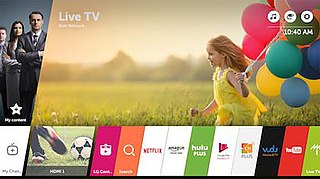
webOS, also known as LG webOS and previously known as Open webOS,HP webOS and Palm webOS, is a Linux kernel-based multitasking operating system for smart devices such as smart TVs that has also been used as a mobile operating system. Initially developed by Palm, Inc., HP made the platform open source, at which point it became Open webOS.

Unix is a family of multitasking, multi-user computer operating systems that derive from the original AT&T Unix, whose development started in 1969 at the Bell Labs research center by Ken Thompson, Dennis Ritchie, and others.
Psion Teklogix Inc. was the operational business of Psion.
An app store, also called an app marketplace or app catalog, is a type of digital distribution platform for computer software called applications, often in a mobile context. Apps provide a specific set of functions which, by definition, do not include the running of the computer itself. Complex software designed for use on a personal computer, for example, may have a related app designed for use on a mobile device. Today apps are normally designed to run on a specific operating system—such as the contemporary iOS, macOS, Windows, Linux or Android—but in the past mobile carriers had their own portals for apps and related media content.

ACCESS CO., LTD., founded in April 1979 and incorporated in February 1984 in Tokyo, Japan, by Arakawa Toru and Kamada Tomihisa, is a company providing a variety of software for connected and mobile devices, such as mobile phones, PDAs, video game consoles and set top boxes.

FBReader is an e-book reader for Linux, Microsoft Windows, Android, and other platforms.
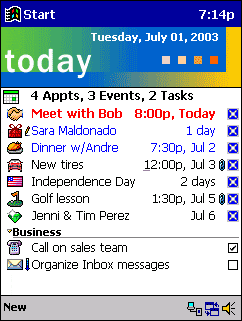
Pocket PC 2000 was the first member of the Windows Mobile family of mobile operating systems that was released on April 19, 2000, and was based on Windows CE 3.0. It is the successor to the operating system aboard Palm-size PCs. Backwards compatibility was retained with such Palm-size PC applications.













